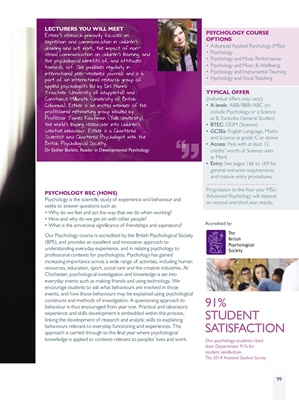
PSYCHOLOGY COURSE
OPTIONS
• Advanced Applied Psychology (MSci)
• Psychology
• Psychology and Music Performance
• Psychology and Music & Wellbeing
• Psychology and Instrumental Teaching
• Psychology and Vocal Teaching
TYPICAL OFFER
(Individual offers may vary):
• A levels: ABB/BBB/ABC (to
include Psychology or a Science
at B. Excludes General Studies)
• BTEC: DDM (Science)
• GCSEs: English Language, Maths
and Science at grade C or above
• Access: Pass with at least 12
credits' worth of Science units
at Merit
• Entry: See pages 166 to 169 for
general entrance requirements
and mature entry procedures.
. . . . . . . . . . . . . . . . . . . . . . . . . . . . . . . .
Progression to the four-year MS ci
Advanced Psychology will depend
on second and third year results.
LECTURERS YOU WILL MEET
Esther's research primarily focuses on
expression and communication in children's
drawing and art work, the impact of nonverbal
communication on children's learning, and
the psychological benefits of, and attitudes
towards, art. She publishes regularly in
international peer-reviewed journals and is a
part of an international research group of
applied psychologists led by Drs Hanns
Trautner (University of Wuppertal) and
Constance Millbrath (University of British
Columbia). Esther is an invited member of the
professional networking group headed by
Professor James Kaufman (Yale University),
the world's leading researcher into children's
creative behaviour. Esther is a Chartered
Scientist and Chartered Psychologist with the
British Psychological Society.
Dr Esther Burkitt, Reader in Developmental Psychology
PSYCHOLOGY BSC (HONS)
Psychology is the scientific study of experience and behaviour and
seeks to answer questions such as:
• Why do we feel and act the way that we do when working?
• How and why do we get on with other people?
• What is the emotional significance of friendships and aspirations?
Our Psychology course is accredited by the British Psychological Society
(BPS), and provides an excellent and innovative approach to
understanding everyday experience, and in relating psychology to
professional contexts for psychologists. Psychology has gained
increasing importance across a wide range of activities, including human
resources, education, sport, social care and the creative industries. At
Chichester, psychological investigation and knowledge is set into
everyday events such as making friends and using technology. We
encourage students to ask what behaviours are involved in those
events, and how those behaviours may be explained using psychological
constructs and methods of investigation. A questioning approach to
behaviour is thus encouraged from year one. Practical and laboratory
experience and skills development is embedded within this process,
linking the development of research and analytic skills to explaining
behaviours relevant to everyday functioning and experiences. This
approach is carried through to the final year where psychological
knowledge is applied to contexts relevant to peoples' lives and work.
91%
STUDENT
SATISFACTION
Our psychology students rated
their Department 91% for
student satisfaction.
The 2014 National Student Survey
Accredited by: